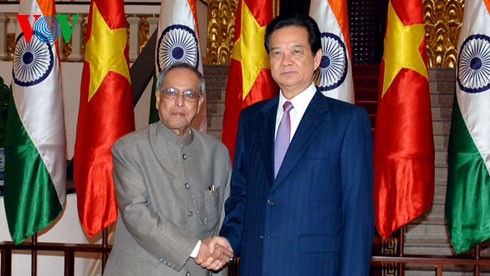(VOVworld)- Prime Minister Nguyen Tan Dung and his wife began an official visit to India on Monday at the invitation of Indian Prime Minister Narendra Modi. The visit aims to strengthen Vietnam-India strategic partnership in economics and expand bilateral cooperation in other areas.

Prime Minister Nguyen Tan Dung met with President Pranab Mukherjee during the latter's Vietnam visit in September 2014. |
During Prime Minister Nguyen Tan Dung’s visit to India in 2007, the two countries established a Strategic Partnership around the five pillars of politics, economics, security-national defense, science-technology and culture-education. Over the past few years, the two countries have increased delegation exchanges, strengthened bilateral cooperation in research and fine-tuned legal frameworks to boost bilateral cooperation. Prime Minister Dung’s visit to India during the next two days will create an opportunity to improve bilateral ties in all fields.
Bilateral trade doesn’t match potential
Vietnam-India economic cooperation has developed steadily over the years on a basis of good political and diplomatic relations. Although trade has increased steadily at an annual rate of 16% over the past 5 years, it has not matched the two countries’ potential. Vu Quang Diem is Vice President of Vietnam-India Friendship Association: “Bilateral cooperation in trade, culture and tourism has developed rapidly over the past few years but it has not matched the potential. Total trade value accounts for a small proportion, about 0.33% of India’s and 1.25% of Vietnam’s GDP and Vietnam’s import surplus from India remains high. India’s investment in Vietnam has increased but is modest ranking 32nd out of 88 countries and territories. Vietnam’s investment in India is negligible. The tourism potential of the two countries has not been tapped. There are no direct flights between the two countries. But I believe that with determination and effort, bilateral ties will be strengthened”.
Former Indian Ambassador to Vietnam Rajit Rae praised the good political, security and defence relationship between Vietnam and India. He urged the two countries to enhance their economic and trade ties: “Our efforts at the Embassy of India in Hanoi have been to try to bring Indian and Vietnamese businesses together. We always welcome Indian business delegations because I think these visits and exchanges of meetings that they have with you provide important opportunities not only for economic cooperation but also provide an opportunity to understand each other and cultural and business practices of each other”.
Deepening strategic partnership
Vietnam pursues a consistent policy of developing its traditional friendship and strategic partnership with India. The Indian government always considers Vietnam a pillar of its Look East policy. All parties in India want to enhance friendship and cooperation with Vietnam. The two countries share several similarities and have closely cooperated at regional and global forums. The two countries’ leaders at all levels treasure this special relationship not just because of political and economic interests but out of friendship. Professor Dang Dinh Quy is Director of the Diplomatic Academy of Vietnam:“Vietnam and India are faithful friends and reliable partners who share interests and vision. Their bilateral relationship has made long strides. Bilateral cooperation in several fields has been strengthened bringing practical benefits for both countries and contributing to peace, stability and prosperity in the region”.
In the face of emerging challenges, both countries are aware of the importance of maintaining their traditional friendship and deepening their strategic partnership. Regular cultural exchanges between the two countries have brought their two peoples closer. The two countries have closely cooperated and supported each other at regional and global forums.
Prime Minister Nguyen Tan Dung’s visit to India, which takes place one month after Indian President Pranab Makherjee’s visit to Vietnam, demonstrates the mutual political trust between the two countries.
i